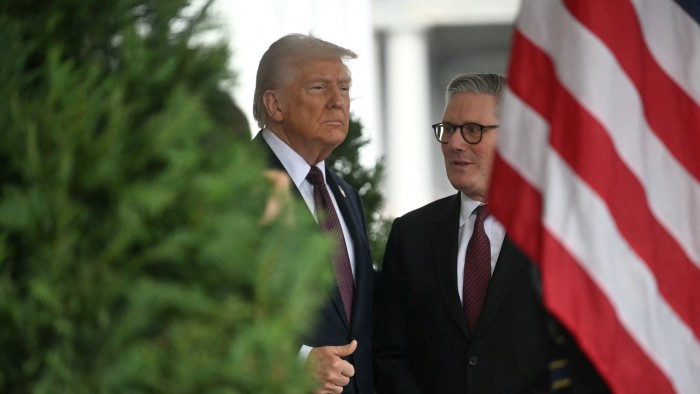This article is an on-site version of our Inside Politics newsletter. Subscribers can sign up here to get the newsletter delivered every weekday. If you’re not a subscriber, you can still receive the newsletter free for 30 days
Good morning. The biggest story in global politics is, still, Donald Trump. Some thoughts on the wide-ranging tariffs he has slapped on many of the US’s allies, and the UK’s relatively easy ride, below.
Inside Politics is edited by Harvey Nriapia today. Follow Stephen on Bluesky and X. Read the previous edition of the newsletter here. Please send gossip, thoughts and feedback to insidepolitics@ft.com
There goes the last great American century
Trump has slapped tariffs of 24 per cent on Japan and 20 per cent on the EU, two traditional allies of the US. He has put an additional 34 per cent on China, taking the total tariffs imposed on them to 54 per cent.
In contrast, the UK has got off fairly easily with a mere 10 per cent. This is, by any measure, a terrific achievement for both the diplomatic service and Keir Starmer personally. His efforts have paid dividends — particularly when you consider that much of what we export to the US is services, which bear no tariffs.
Anyone who wants to quibble about what Starmer or his ministers have said or done when it comes to Trump has to reckon with how good (relatively speaking) the UK’s position is, and ask themselves why they think an alternative approach would have done any better.
But the government’s problem is in those words, “relatively speaking”. The UK is a small, open economy, and what Labour’s diplomacy has won us is, in the grand scheme, not all that much.
It’s impressive in the same way as, say, Rishi Sunak’s courage as chancellor in raising taxes or Ken Clarke’s performance in the same job in 1997 was. It’s an achievement in a similar way to the work put in by Gordon Brown and Alistair Darling during the global financial crisis. A fair-minded observer has to applaud it. But I’m not sure there are all that many votes in it.
The risk to the government is that it ends up as the foreign policy equivalent of the Liberal Democrats in 2015. The Lib Dems’ list of achievements in coalition, both in terms of legislation passed and policy implemented, was long. But the party was ultimately judged and found wanting based on what the coalition government did, not on what it stopped happening.
In a country that vehemently dislikes Trump, there isn’t an electoral dividend to be won as “the guys who palled up with him and made things slightly less bad”.
There are two politicians with a lot to gain here. The first is Lib Dem leader Ed Davey, who is the only major party leader saying what most British voters think when it comes to Trump. The second is Kemi Badenoch, leader of the opposition. While she seems, to put it mildly, confused as to what her position on Trump and tariffs should be, she still leads the largest opposition party. So she is best placed to take advantage of any shocks that might hit the global economy and, in turn, any jolt to the public’s support for the government.
For Starmer, the UK’s relatively easy ride when it comes to tariffs is a sign the government is doing something right. But doing something right may not be enough to keep an increasingly fractious Parliamentary Labour party on side.
Now try this
I’m really enjoying the terrific, choice-based video game Scarlet Hollow at the moment. It’s a nice bit of horror about a town hiding a dark secret.
Top stories today
-
Value for money? | Tees Valley Combined Authority, chaired by Ben Houchen, is to be issued with a formal notice today because of concerns over its governance and value for money for taxpayers, according to two people familiar with the matter.
-
‘Sacrificial lamb’ | The decision to abolish NHS England came after months of tension between health secretary Wes Streeting and officials in the health service. Read the inside scoop on the fall of NHS England.
-
Fine, for now | Keir Starmer will convene senior ministers on Thursday to discuss the global trade chaos sparked by Trump’s so-called reciprocal tariffs. Here are the threats that still remain for the government.




